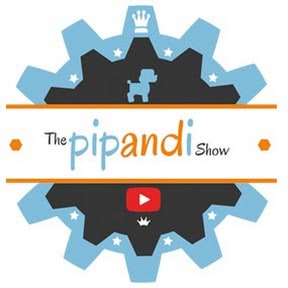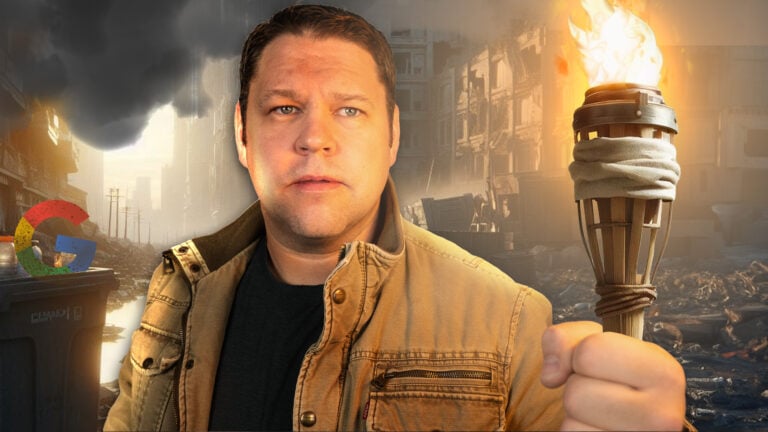Internet marketers spend so much time discussing Google search SEO that I think we often overlook some of the other large and valuable search engines. Podcasting is the core of my brand, so I care very much about how my podcast ranks in iTunes.
Over the course of the last year, I have watched my podcast go up and down in iTunes rankings as I’ve performed a series of experiments to get my podcast ranking high. At the time of writing, my podcast is ranking very high for its main keywords and has sustained its spot for several months.
Unlike Google that is the world’s most advanced algorithm, iTunes is incredibly game-able. If you listen to podcasts and have searched for new shows, you know that iTunes does a horrible job of keeping fresh shows ranking high and weeding out the old shows that are no longer updated and are collecting dust.
In the category I am targeting, there are 336 podcasts. 14 of the top 25 podcasts for that keyword are no longer being produced and have not released an episode in six months. While many podcasters are frustrated with Apple for not fixing its podcast rankings to unearth better content, I see things like that and say, “If I figure out what’s broken with this search engine, I can make it work for me.”

Here is Where I Am Now
I want to tell you where my show is ranking right now in iTunes so that you can get a sense for what about iTunes rankings I’ve been able to figure out, and where I am still struggling to rank as high as I would like.
I submitted my show to iTunes over a year ago, and I am well over one MILLION downloads! I have produced 40 episodes in the last year. Think about that! One MILLION downloads of a 45-50 minute podcast. That means my listeners collectively spent 93 years, 3 months, and 24 minutes listening to my show!
There are 336 podcasts about photography (my niche). I am currently ranking at #14 when someone searches for podcasts about the topic from iTunes on a computer. But then I noticed that when searching from an iPhone in the podcasts app, I rank #12.
When searching podcast episodes about photography, I rank #1 on both the phone and the computer. I have a really awesome trick for you on ranking in the episodes list.
If you just open the Arts category (my main category) and browse for my show on the computer, my podcast is basically non-existent; however, if you open the arts category on the phone, I rank #4 out of tens of thousands of podcasts. That was news to me. I did not realize that the rankings shown in the official podcasts app would be different than the rankings shown in iTunes, but sometimes they are.
How iTunes Ranks Podcasts
Over the last year, as I have conducted the experiments and tests with my podcast, I have seen when I got good bumps in the rankings, and when my efforts didn’t do much or even hurt my ranking. I believe that the following factors, in somewhat of an order, are what iTunes considers the most important in determining rankings for podcasts in iTunes.
- Keywords to tell iTunes what your show is about. Unlike Google that does not even make use of the keyword meta tag in determining search results, iTunes relies heavily on it. This is good to know so you can try changing things around, but I’ll assume you’ve already spent some time thinking about this one.
- How old the podcast is. Like Google, iTunes likes to see that a podcast has been around for a long time. This factor is good because iTunes knows a show that has been listed for a long time is likely to have reliable downloads, but it does not do a good job of watching for freshness as well. I found several examples in rankings where a show started back in 2007 with only 20 episodes ranks far higher than a show created in 2009 with 300+ episodes and a large audience. That leaves shows created in more recent years in the dust!
- Whether the show is video or audio. iTunes does have tools on some of its search methods to separate audio and video podcasts, but when results are combined, video shows often rank unbelievably high when compared to audio only shows. This is unfortunate, as I have never gotten into the habit of watching video shows, and frankly most of the people I know only follow audio shows.
- The percentage of podcast searchers who click on your show in search results. This is a hunch and I really have no idea how this could be tested to confirm. Basically, as I look at podcasts that really shouldn’t be ranking high but which are, I notice that they have really nice show titles and artwork. That leads me to believe that iTunes is manufacturing rankings on either which podcast people tend to choose (like Amazon’s rankings which try to guess what you’ll buy), or else it builds into its rankings the number of new subscribers to the podcast (like Google giving search results that people tend to click on).
- The number of keywords your show could rank in. As you’ll see later, I have found unbelievable success from reducing the number of keywords my show uses to target one main keyword. If your show is about football, soccer, baseball, sports, coaching and volleyball, it is difficult for iTunes to know if searchers about travel photography will really like your show, or if your show is only tangentially related to that topic. This tip has a tremendous effect for episode searches, but seems to have no effect for podcast searches.
- Reviews of the podcast. My show has more 5-star ratings than any other podcast I know of in my category (nearly 1,000 5-star and only a handful of any other star rating). Despite the extremely positive reviews of the show, my show ranks lower than some other shows with only a handful of reviews. This makes me think that reviews either do not impact or do not have much of an impact of the podcast rankings in iTunes proper. My hunch, however, is that the Apple Podcasts app is using reviews as a key ranking factor, which would explain why my show is at #4 in the MASSIVE Arts and Entertainment category.
- Downloads in the last 24 hours. I have definitely noticed that my show ranks higher in iTunes when a new episode was just released and I see a spike in the downloads. This is likely why daily shows rank so well in iTunes.
- Specific country. Remember that iTunes has separate iTunes stores for each country. You can rank well in one country and poorly in another.
What Worked for Me
Three things that worked for me are (1) contests to encourage listeners to review the podcast, (2) reducing keywords for episode titles, (3) publishing frequently, and linking to iTunes rather than my site.
Contests to encourage reviews
From the very first episode of my show, I picked one random reviewer to win a free online photography class with me. That’s a $98 value, so it really encouraged people to leave reviews. We received over 1,000 reviews in the first year of the podcast, which is remarkable.
Reducing keywords for episode titles
This is my favorite trick. iTunes separates the rankings of podcasts from the rankings of individual episodes. I decided to run an experiment once and created an episode simply titled “Photography” with no other words in the title. That episode shot up to #1 in the episode rankings (which shows up very visibly in iTunes). That episode has remained #1 for months.
So the tip is to release a series of episodes targeting all of the keywords your show is about with only one word: the keyword. So if your show is about online marketing, release an episode called SEO, an episode called Internet Marketing, an episode titled blogging, etc.
Publish frequently
Publishing frequently has a massive impact on rankings. We once took a 2.5 week break from publishing the show while moving offices. Our show plummeted in rankings and it took some time to get back. You’ll also notice that shows which publish daily rank very very high in general.
Choosing a generic podcast name
For more on this technique that not only helps you to rank higher but also makes people more likely to subscribe to your show, read the full iTunes naming article (opens in a separate tab so you can continue reading here).
Link to iTunes rather than to your site
One tip I’ve found recently is when I publish a new episode, instead of linking to the new episode on my site when I post about the new episode on social media, I post the iTunes web link on my social media accounts. By doing this, the people who listen to the episode on the computer (it still surprises me how many people do that), go through iTunes and count toward downloads in iTunes. If you link them to your site, they listen to the show and you’ll see the download in Libsyn, but if you link them to iTunes, they are counted toward your iTunes SEO as well as showing up as a download in Libsyn.
iTunes usually takes about an hour to show new podcast episodes after you publish. So publish your episode and then wait an hour and post on social media with the iTunes link.
Another benefit of this method is they are all sent to iTunes where they can easily subscribe, AND they do not need to have iTunes downloaded in order to listen to the episode. The iTunes web interface allows you to listen to the show right there.
What did NOT work
A few things that I ran experiments with which did NOT work are: (1) Reducing meta keywords for the podcast, and (2) Publishing on different days.
Reducing meta keywords for the podcast
Earlier I mentioned that changing the title of your episodes to only include one word which is the keyword was an excellent strategy for making episodes rank higher. I wondered if the same would be true for the podcast and found it didn’t matter.
I had 12 meta keywords (the max allowed) for my show, but I experimented for 3 weeks by just putting one keyword in the list: photography. After a few weeks, I found no significant change in my podcast rankings for that keyword.
Publishing on different days
I experimented pretty significantly with publishing my episodes at different times of day and on different days of the week. As it turns out, it made no difference at all. What I did find made a difference was when I publish about the new episode in social media.
How I Nearly Tripled My Podcast Downloads Overnight
I’ve worked for years on building up my podcast audience and each of these tips have been helpful to some degree or another. But a few months ago I flipped the right switch which nearly tripled my downloads. It has been AMAZING for my business, and I’ve never heard any other podcasters talking about it.
Here it is: I simply turned on a video camera and recorded me doing the podcast. I then posted the video to Youtube after each episode, and also stream it live on Facebook Live. Simple, but it has been AMAZINGLY powerful!
I’m now getting about 8,000 people watching my Facebook Live stream and between 1,500 and 35,000 people watching the youtube video depending on how well the topic translates to a video. It has been INCREDIBLE!
If you’re interested in learning more about this strategy and some of the other things I’m doing to get traffic to my podcasts, check out Podcast Advance. It’s a 3.5 hour audio course that I created where I share some of the things that are actually working for me to build up the largest podcast network in my niche.
I realize that Podcast Advance is priced just way too low, but it’s a brand new product and I’m excited about it so I want to see people picking it up and using it. The price will definitely go in the near future.
Conclusion
If you enjoyed this post and found it useful, please let me know in the comments. I spent a ton of time testing, researching, and writing about this so I hope it was useful.









